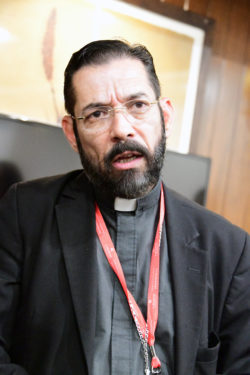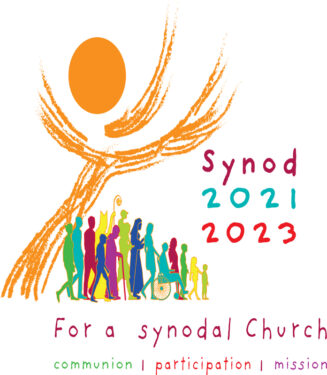By Bishop Daniel E. Flores
Pope Francis speaks often of the importance of seeds being planted, and of the need to give them time and attention as they grow. He mentions this frequently in “The Joy of the Gospel.” This image, I think, is the best place for us to begin to understand the Holy Father’s call for a worldwide synodal action in the Church.

The synodal action is a seed planted that offers hope of renewing our sense of common identity and mission as Catholics in the world. It is not a quick fix; it is a renewal of the way forward in a way proper to our baptismal dignity.
It is a deliberate effort to create spaces and times in the Church for us to exercise the most basic aspects of our baptismal grace: invoking the Holy Spirit to move us anew, listening to Scripture and each other with reverence and respect, discerning together how to move forward as the communion of the baptized called to witness to Christ Jesus, crucified and risen from the dead, and truly present in the world.
It starts locally, in parishes and small mission chapels, in apostolic movements, on college campuses, in immigrant refugee centers, and in soup kitchens, any place really, where we can gather for a time of reflective prayer and listening and speaking about the more foundational aspirations that the Lord Jesus puts in our hearts.
It involves a few basic questions to start the conversation: “How do I experience the Church as a place of communion and joy?”; “How do I not?” “How do I live my witness to Christ and the fullness of the Gospel he announced?” There are other questions we can begin with, but they all start with “I” and “we,” not with “us” and “them.” The divisions between “us” and “them” (in whatever way we in the Church can fall into dividing each other up) are grievously debilitating the mission.
Synodality is a simple action, childlike almost, but it is so difficult for us. It is difficult for us, as Pope Francis has rightly discerned, because for too long we have been formed by pressures and social examples that eschew the primacy of the prayerful listening posture that is proper to the church. We are all variously influenced by a culturally ingrained habit of listening only for the sake of seizing the first opportunity to interrupt; listening, so we can gather ammunition to win the argument; listening, only to those whose opinions are “important”; listening, only by appearance, not really hearing the heart animating the sense of what someone is saying.

And so, by default, we become divided into groups that only talk among themselves, and only rarely with someone who may have a different perspective, a different starting point, a different priority. The Church is not a political party, nor a corporation, nor a social club, nor an NGO. And though we know by instinct of the Spirit what we are not, we can do better at consciously expressing more clearly who Christ has made us to be.
The Church is a “we” that exists as a communion within the “I” of Christ. In the Spirit poured out by Christ through his dying and rising, we can overcome our tendency to interrupt, and argue and ignore. But it is a habit of grace that, like a sprouting seedling, must be appreciated and cultivated, and allowed to grow.
The synodal action also involves gathering the local sense of the baptized into a series of regional and national summations that will ultimately find expression in a Synodal Assembly in Rome. But the local aspect is meant to remain active and continue to grow as a manifestation of local communion and mission.
Ever since St. Paul challenged St. Peter on the issue of how the Mosaic law applies to the communion of those baptized in Christ, our history has always included dramatic moments of contention and disagreement. But it is the way of the Church to resolve them by starting from our common identity in Christ, as brothers and sisters bound to each other because we are all connected in Christ. The common responsibility of the baptized is to hear patiently, to reflect commonly, and to move forward together as decisions are made.
Bishop Flores has headed the Diocese of Brownsville since December 2009.

